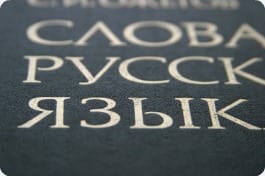Russian Language Teacher Certification

Russian is one of six official United Nations languages, boasts about 170 million native speakers, and is the fourth most widely-spoken language in the world. Certified Russian teachers are needed to help students master this important global language as Russia regains its political and economic standing in the world.
On This Page…
Although the Russian language fell out of favor with countries in Eastern Europe after the early 1990’s, the language has begun to grow again in importance in dozens of industries. Students must learn to speak this language if they plan to work for international companies operating in Russia or if they plan to work for the U.S. government in positions in which they will have significant contact with Russian speakers. Russian teachers are fundamentally important to the success of these students’ futures. They provide the language and cultural tools needed to operate effectively in Russia.
What is Certification?
School districts hire certified teachers to ensure that their students succeed after graduation. When a teacher possesses a certification from the state department of education, it indicates that the teacher has passed rigorous testing and achieved high educational standards.
- Translation Courses
- Russian Language Courses
- Russian Literature
- Russian and Soviet Cinematography
- Russian Culture
The first step to becoming a Russian teacher is to earn a bachelor’s degree in Russian to help perfect your Russian skills and knowledge of its history, literature and culture. You can simultaneously pursue a bachelor’s degree in education to fulfill your state’s teacher preparation requirements. You might also pursue the degrees separately. If you wish, you can pursue a master’s degree in Russian and/or education, but it is not necessary to teach in public schools.
After you complete your bachelor’s degrees, you will take an exam that demonstrates your proficiency in Russian. You will also take an exam that demonstrates you meet the state’s basic requirements to teach. Some states require teachers to first complete a teacher preparation program for a general teaching field, such as elementary education or secondary social studies. After that, teachers can take an exam to become licensed as a Russian teacher. Other states will allow teachers to get their initial license in teaching Russian.
If you do not have a bachelor’s degree in Russian, but you are fluent in the language and have a bachelor’s degree in another field, your state may allow you to take a Russian proficiency exam and complete a state-approved teacher training course to become a Russian teacher. The requirements for this route to teacher certification vary by state, so check with your state’s department of education for further information.
Explore teaching certification requirements in your state to learn how you can earn your certification.
What You Need to Know
Before a teacher can become licensed, it is necessary to pass a content knowledge exam. The exam for Russian teachers is typically divided into sections that test listening, speaking, reading and writing skills. During the listening part of the exam, teachers identify key information in a listening passage or infer meaning from a conversation or statement. In the reading section, they answer main idea questions and questions about detail. They also answer questions regarding the author’s attitude toward a topic in the passage that may not be explicitly stated. Their grammar and structure skills may also be tested in exercises in which teachers must revise incorrect sentences or transform a sentence into another type of sentence (i.e. from a question into a statement, or from a positive to a negative statement).
- Russnet – This website offers a wide variety of teaching resources specifically for Russian Teachers.
- Russian Language Journal – This periodical is bilingual and offers resources related to the culture, history and language of Russia.
- Foreign Language Teaching Forum – This website offers a long list of resources of interest to foreign language teachers in general.
Beyond knowing Russian, teachers must have a superior grasp of second language learning theories. Understanding how second language learners pick up another language is vital to being a successful Russian teacher. Knowing these theories helps Russian teachers design lessons so their students are most likely to retain them. For example, teachers familiar with Long’s interaction hypothesis know that students learn another language best when they have to use it. When a breakdown in communication occurs, students must negotiate meaning to be understood. Teachers can encourage students to have interactions with native speakers or use role-plays in the classroom to help their students learn.
An effective Russian teacher incorporates authentic texts, media, games, role plays and other activities into a lesson to make it real and relevant to students’ lives. Simply following the textbook is not the best way to ensure that students retain a lesson’s information. Instead, a lesson should be engaging, utilizing different types of teaching materials and activities to encourage participation. Furthermore, students should understand the goal of the lesson from the beginning of the class period, and they should also be given plenty of guided and independent practice.
Students should enjoy going to Russian class. One way to do this is to incorporate Russian culture into lessons. For example, students can cook traditional Russian food like borscht and share it in class, or exchange gifts near New Year’s Day, which is an important gift-giving holiday in Russia. Students can practice their speaking and research skills by giving a presentation in Russian on Russia’s role in World War II on Victory Day on May 9th as well.
Another interesting way to teach Russian culture is to play “Guess the Artist,” a game in which students guess the Russian artists of different types of classical and modern Russian music from a list on the board. Finally, students can also work in groups to translate lyrics from a popular Russian song and then compare their translations and discuss the lyrics. Since learning about culture is a vital part of learning a language, it should be exciting and interesting. Thinking beyond the textbook will make a Russian teacher’s class memorable and enjoyable.
Why Russian Teachers are Important
In a 2005 report entitled “Tapping America’s Potential: The Education for Innovation Initiative,” 15 of America’s most significant business organizations asserted that the U.S. should increase by two fold the number of undergraduate degree holders in math, technology and science. As the United States refocuses its educational system on technology, math and science in the coming years, learning Russian will become advantageous for students pursuing degrees in these fields, especially since Russian is a popular language of publication in science. As a result, Russian teachers are likely to become even more important in the near future.
Furthermore, Russia is slowly growing as an important economic and political power in the world, especially in Europe, according to Amy Baker of the Language Travel Magazine in a February 2010 report. Additionally, many international companies like Toyota, Starbucks, Morgan Stanley, and Pfizer International do business in Russia. As Russia regains its foothold of influence in the world, there will likely be an increase in the number of students who want to learn Russian for the sake of business, despite the number of students learning Russian falling dramatically in the last 25 years.
The drop in the number of Russian experts means that more job opportunities should become available for those who speak Russian, especially if the economic turn-around many expect in Russia materializes. This will open more job opportunities for students that speak Russian and English. Russian speakers can work as business and financial policy analysts and consultants in industries like marketing, advertising, aerospace and computer engineering. Publishing, broadcast media, and nonprofit organizations also regularly employ Russian speakers.
Finally, Russian teachers introduce students to timeless Russian artists in music, cinema, political and social thought, science, mathematics and literature. The full impacts of Dostoevsky, Pasternak, Tolstoy and countless others would be lost to students without the guidance of Russian teachers who unlock the work of these individuals by providing the gift of a second language. When students can understand the implied connotations of high-level vocabulary words and expressions and grasp difficult grammatical structures, they can better appreciate and comprehend what they read and hear. They can delve into the works of the Russian masters in dozens of subjects in ways that they could not if they just read or watched English translations or interpretations.
How Certification as a Russian Teacher Will Prepare You to Teach
A licensed Russian teacher is more than just qualified according to the laws of the state. The certification process prepares a teacher to create exciting lessons with clear objectives that will help their students connect with the culture and life of the Russian Federation and other countries that use Russian as a language of business.
Likewise, certification puts teachers into contact with the latest in technology for teaching. Using the Internet is vital to helping students connect with other Russian learners and native Russian speakers, literature and news. The more authentic and relevant the content and delivery lessons are to students, the more likely students are to participate and pay attention.
Moreover, certification provides guidelines for student assessment and evaluation. Language learners must continually be challenged in some areas, but must also receive remediation in other areas they find difficult. Learning how to successfully teach and assess each student individually is vital to managing a classroom. Final projects, writing assignments and speaking assessments can help a teacher learn how well students are learning the language in ways that perhaps a standardized test cannot.
Staying Connected
Commitment to professional development continues after certification. The American Association of Teachers of Slavic and East European Languages and the American Council of Teachers of Russian are two resources that help teachers share ideas and become even better at preparing the next generation of Russian speakers.









